So Small a Beginning: Part 4
July 8, 2020Sr Marie Foale speaks about the beginnings of the Institute of St Joseph for the Catholic education of poor children.
She believes that as a young Josephite growing up, she had a sense that one day Mary MacKillop and Julian Tenison Woods had made a spontaneous decision to found an order.
Reflection on Mary MacKillop
Mary MacKillop Continues to Make a Difference.
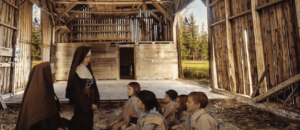
By the end of 1882 we had a foundation in the south coast of New South Wales, Albion Park. Archbishop Vaughan asked us to take over St. John’s School in Kent Street, Sydney. The people were very poor around Kent St, which was ‘a scene of much human misery’. Every day one of the Sisters cooked a substantial meal for the children and a hot drink was ready for them when they arrived at school. Even on Sundays the sisters cooked breakfast for the children and their parents. Our sisters truly were servants for the poor.
Extract from ‘The Letter under the Pillow‘ by Clare Aherne (2016) Chapter 11, pp. 59-60. Carrowmore Publishing Ltd, Ireland.
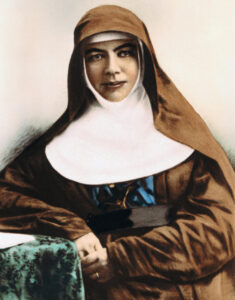
Mary MacKillop was a woman who championed the rights and needs of the poor in the community. Mary and the early sisters worked exceedingly hard to make a difference to the lives of the deprived. It seems remarkable that the sisters were able to provide such sustenance and assistance when they too relied on Providence. No doubt they sought out donations and went begging for food to enable this marvellous ministry to the poor.
Mary and the Sisters also knew suffering and death.
Let us reflect…
- What feelings well up in you when you think of Mary’s generosity in these early days?
- The present COVID-19 crisis paints a grim picture of hardship, sickness and death in the community.
What has affected your life during this time?
Have you been able to help others cope with endure their plight? - Are we able to extend kindness to our neighbours of all cultures?
Let us pray.
Michele Shipperley rsj
Image:
[1] The Story of Mary MacKillop a short film by Holy Family Primary, Granville. Obtained from Cath Family.
A Day in the Life: Ministry with Survivors of Human Trafficking
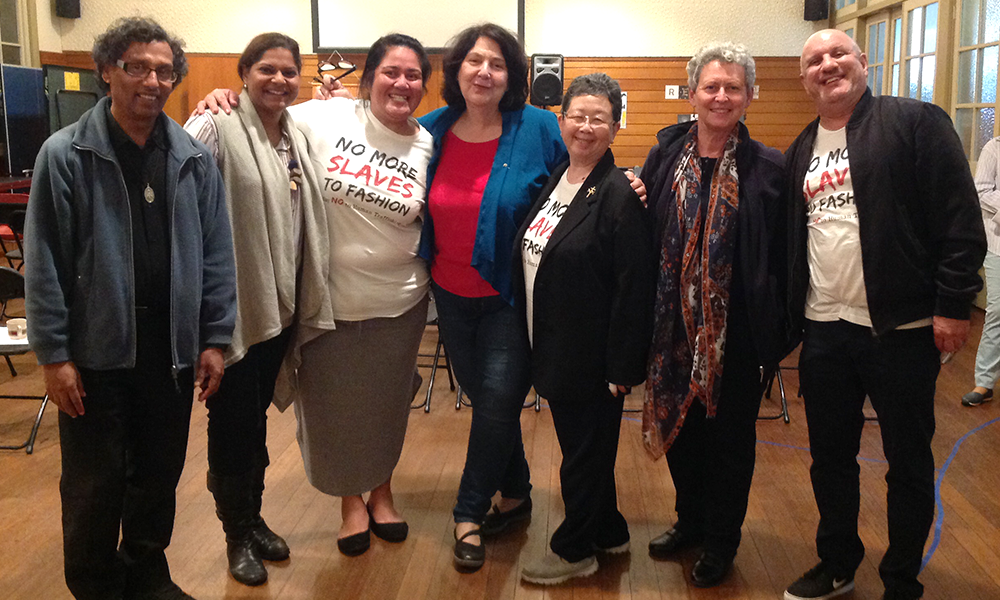
The Impact of COVID-19.
In 2005 I established Josephite Counter-Trafficking Project (JCTP) to promote, by way of holistic direct services, the spiritual, physical and emotional development of people who have undergone the trauma of being trafficked to Australia. Since then I have continued to provide culturally sensitive support and direct services to trafficked children, women and men with a view to improving their quality of life and to facilitate cultural and social integration, and rehabilitation.
Click here to continue reading
Ministry with Survivors of Human-Trafficking (PDF)
Margaret Ng rsj
Promoting the Dignity of Peoples
Dignity and Shame.
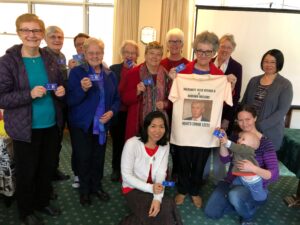
There’s nothing very dignified about crucifixion. The indescribable pain would probably blot out the public ignominy of dying slowly as a naked criminal. Who would willingly put themselves in this place of shame? [1] Jesus did. Not to save us from an imaginary divine anger but to show us the end result of what we humans do to each other.
Who would willingly put themselves in the place of shame today? Mary MacKillop did in her day. She was with the poor, those oppressed by the powerful, the object of calumny, manipulation and intrigue. She recognised people’s fundamental rights and worked with them, championing their dignity, and in the process, claiming her own. “Of the Cross” has its own unique dignity, an inversion of the usual, a quelling of human violence from the inside.
The plight of the oppressed today must be drawn into our Christian soul, two responses could be: immediate aid to the suffering, and challenges to those wielding power.
Serious social ills which erode the dignity of people exist today and are no less confronting than those in earlier times. Australian society tolerates and even gains from the production and exclusion of non-persons. Those in power boast of the feat of “stopping the boats”. This triumph is accomplished partly by the deterrent of detaining a number of people who came to Australia by boat after a certain arbitrarily chosen date – 19 July 2013. Not one of those people has been charged with any crime against international or domestic law, yet some now detained under this regime have been there for seven years. They are innocent people who happened to approach Australia at the wrong time. The great majority are recognised as genuine refugees and have that status under international law, yet their only option for release is to return to the place of danger from which they escaped. Australia has even refused New Zealand’s offer to accept 150 of them per year. Those who claim the mantle of Mary MacKillop must ask: what would she think and do about this?
So many other assaults on human dignity exist in Australia. These affect, for example, the First Peoples, people on temporary protection visas, those suffering human trafficking, homelessness, child abuse, domestic violence, climate change, the recent fires, joblessness and Coronavirus. Many other threats to human dignity challenge our Australian response, among which the oppressed people of West Papua remain a singular weight on our collective conscience. As in Mary MacKillop’s time, glib answers to human problems can be made which generally amount to blaming those in distress––they should work harder, get a job, go back to where they came from, keep their mouths shut, she shouldn’t have married him, they’re bludgers, they must have done something wrong, etc., etc.
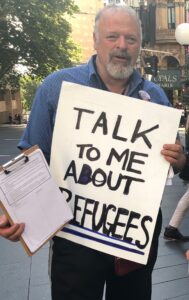
In Jesus’ case it was considered better for one to die than for the whole nation to face threat (John 11:50). This is the quintessential description of a scapegoat – the substitute sacrificed for the benefit of the dominant group. The very sacrifice of Jesus unveiled the mechanism of scapegoating––the blame and destruction of one for the comfort of many. Without formulating this reality, and in the context of different social and theological structures, Mary MacKillop and so many others recognised the likely candidates for scapegoating, stood beside them, and shared their place of shame. That’s our call too.
Susan Connelly rsj
Footnotes:
[1] James Alison coined the phrase “place of shame”. Visit http://jamesalison.com/
Julian Tenison Woods: A Life – Chapters 12th to 14th
July 7, 2020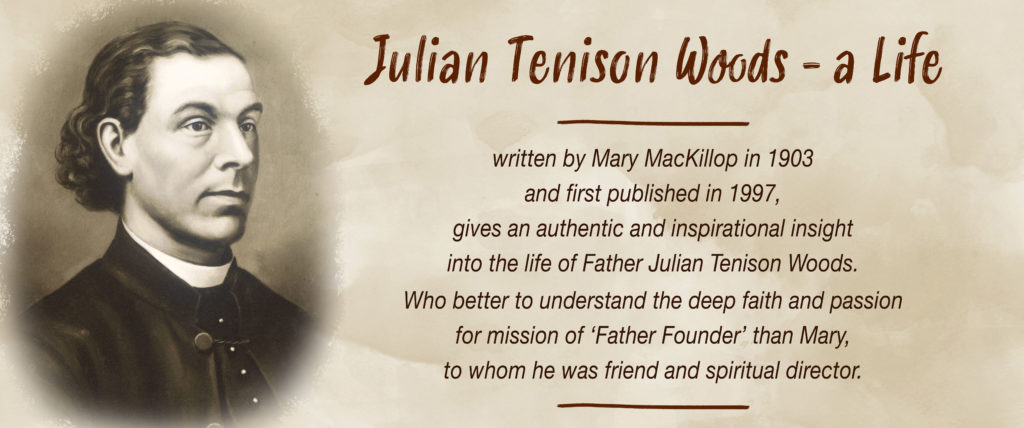
Chapters 12th, 13th and 14th
Among the residents of Portland who became intimate friends of Father Woods was the MacKillop family. Mr MacKillop was the eldest brother of Mrs Alex Cameron of Penola Station, and Mrs MacKillop the sister of Mr D McDonald also of Penola…[1]
The Catholic School in Portland required a teacher and Miss MacKillop wrote to Father Woods on the subject. In reply, 30 August 1863 he said: ‘I think if you can take it for a time, so much the better. You might, until the school here is vacant…’[2]
NAIDOC Week 2020
July 6, 2020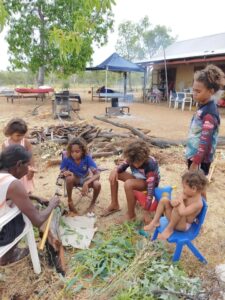 NAIDOC Week celebrations are held across Australia every July with many events to acknowledge Indigenous history, culture, and achievements.
NAIDOC Week celebrations are held across Australia every July with many events to acknowledge Indigenous history, culture, and achievements.
However, due to COVID-19, NAIDOC week was postponed for 2020. Or did it come earlier?
This year’s theme for NAIDOC week is Always Was, Always Will Be. It recognises that First Nations people occupied and cared for the Australian continent for over 65,000 years. They were the first explorers, farmers, botanists, scientists, diplomats etc. This is something Bruce Pascoes’ award winning book ‘Dark Emu,’ has honoured and affirmed. In a TED talk he says, “I wrote the book to convince Australians that Aboriginal people were farming on their own land.“
Over many years, reading, listening to others and occasionally meeting an indigenous person contributed to raising my awareness of indigenous peoples. However, seven years ago, I moved to Warmun – a remote Aboriginal Community in the Kimberley. As stations in the surrounding areas were claimed by white settlers, the traditional owners were moved off their land to live together in Warmun. For me, to be part of this community, moved my awareness of Indigenous culture to another level…. a place where I saw firsthand and began to understand the deep spiritual and cultural connection to country. Country encompasses an interdependent relationship between an individual and their ancestral lands. When people talk about country it is spoken of as a mother, i.e. we speak to country, we worry about country, and we long for country.
‘This is my country and that’s why we stay out here’
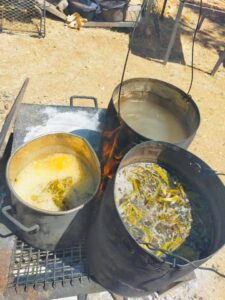 During the early days of the COVID-19 epidemic, people were encouraged to return to their homes. It was no surprise that Indigenous people returned to their homelands to wait out Coronavirus. Shirley Purdie, an elder of the Warmun Community said:
During the early days of the COVID-19 epidemic, people were encouraged to return to their homes. It was no surprise that Indigenous people returned to their homelands to wait out Coronavirus. Shirley Purdie, an elder of the Warmun Community said:
Shirley was born at Mabel Downs or Gibun in her language. There are two houses, but most prefer to drag their mattresses outside and sleep under the stars.
To understand more, view Shirley’s remarkable story
“The benefits of being on country are tangible – spiritually, culturally and physically!”
Shirley’s daughter, Madeleine, posted on facebook …
Sowing the Seeds
July 1, 2020Elaine Wainwright* gives an ecological reading of the parable of the sower, Matthew 13:1-22.
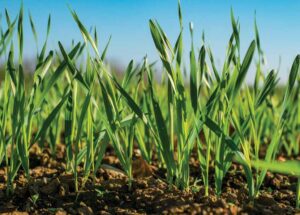 We have celebrated the fifth anniversary of Pope Francis’s encyclical, Laudato Si’, influential within the Catholic community and in the global religious and scientific communities. It marked the growing consciousness within the human community that we share our common home, Earth, with all its other inhabitants and life-forms. This consciousness is deepening.
We have celebrated the fifth anniversary of Pope Francis’s encyclical, Laudato Si’, influential within the Catholic community and in the global religious and scientific communities. It marked the growing consciousness within the human community that we share our common home, Earth, with all its other inhabitants and life-forms. This consciousness is deepening.
One contribution to this shifting consciousness is through reading the biblical text being attentive to the human characters and to the other-than-human participants in the biblical drama. Such a reading, in its turn, re-reads us.
Matthew 13:1-9, the Parable of the Sower accompanied by an explanation Mt 13:18-23 is well known. Like many parables, it is grounded in the material. We read of sowers and seeds and types of soil. Reading ecologically invites us to allow this materiality to function in our making meaning of the text…
Continue reading the article below:
Tui Motu Issue 250, July 2020 (PDF)
Media Release: CRA
June 30, 2020100% of Religious Institutes named in Royal Commission Join National Redress Scheme

“The commitment of Catholic Religious Australia members to work compassionately with survivors of child sexual abuse has been ongoing for 20 years and continues to be demonstrated by religious institutes joining the National Redress Scheme (NRS),” said Br Peter Carroll FMS, President of Catholic Religious Australia (CRA)…
You’re invited to continue reading the Media Release and visit the CRA website below:
